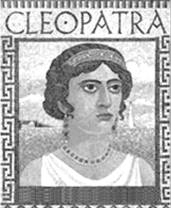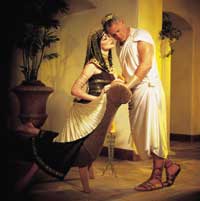"Cleopatra’s
Passion"
The Story of ANTONY & CLEOPATRA
adapted from http://www.love-story.com/story5.htm
When Cleopatra heard that the strapping
red-haired general was waiting for her in
the foray of her palace, she greeted the
news with a smile. She had first met Marc
Antony many years before in Egypt , when
she was only a child. She had liked him from
the start. Now he was one of her only friends
in Rome . The two shared one compelling bond:
Both were fiercely loyal to her lover, the
great Julius Caesar.
The moment she laid eyes on Antony , her
smile faded. His face gave her the grim news
before his words. Julius Caesar was dead,
murdered by his own “friends” in
the Senate. Cleopatra and her son, Caesarion,
were in terrible danger. There was no time
to lose. They must get out of Rome immediately.
Cleopatra had married Caesar in Egypt .
Though the marriage was not recognized in
Rome , Caesarion was Caesar's only son. A
child of only three years old, Caesarion
would be a threat to those who wanted to
rule in Caesar's place. Worse, the Roman
citizens generally hated Cleopatra, his mother.
Cleopatra was blamed for Caesar's excessive
ambition, his desire to convert Rome from
a republic to an empire with himself as emperor
and Caesarion as his prince and heir. Some
claimed she had bewitched Caesar with African
magic.
 In
truth, Cleopatra was not really African.
She was Macedonian (Greek), descended from
the man Caesar admired most, Alexander the
Great. Though blonde-haired and fair-skinned
- she wore a dark wig in public as part of
her ceremonial headdress - Cleopatra was
hardly a classical beauty. But she possessed
more than a prestigious ancestry and wealth.
To present herself before Caesar for the
first time, she rolled herself up in a Persian
rug to avoid an assassin’s knife. She
was bright, clever, resourceful and - most
of all - original. There was little doubt
that Caesar truly loved her. In
truth, Cleopatra was not really African.
She was Macedonian (Greek), descended from
the man Caesar admired most, Alexander the
Great. Though blonde-haired and fair-skinned
- she wore a dark wig in public as part of
her ceremonial headdress - Cleopatra was
hardly a classical beauty. But she possessed
more than a prestigious ancestry and wealth.
To present herself before Caesar for the
first time, she rolled herself up in a Persian
rug to avoid an assassin’s knife. She
was bright, clever, resourceful and - most
of all - original. There was little doubt
that Caesar truly loved her.
Caesar was a serious thinker and philosopher,
a man who nearly held the world in his hands
- and knew it. He was a man who was destined
to be remembered throughout history.
He had but one weakness, however. Since
he was born, he had suffered occasional epileptic
seizures. These seizures grew worse under
stress, striking often at the worst possible
times. Caesar was terribly embarrassed by
these seizures, but in Cleopatra he discovered
a partner who could nurse him through his
illness, shield him from the public eye,
and even make decisions when he was unable.
In a sense, his weakness drew them closer,
forming an unbreakable bond of trust.
Antony 's desire to help Cleopatra in this
time of danger was probably based as much
upon his loyalty to Caesar as anything else.
There is no evidence that any relationship
beyond friendship existed between Antony
and Cleopatra before the assassination of
Caesar. Still, Antony was taking a considerable
risk in helping Cleopatra. As Caesar's favorite
general, he would be part of the Second Triumvirate,
chosen to rule in Caesar's place. Antony ’s
alliance with the unpopular Cleopatra would
strengthen Antony ’s enemies against
him in Rome .
However, in the moments following Caesar's
bloody murder, all Antony could think of
was getting Cleopatra and young Caesarion
out of Rome . Legend has it that Antony disguised
himself as a pregnant beggar woman, strapping
little Caesarion to his belly. The muscular
Antony would have made a rather frighteningly
large beggar woman, but the disguise apparently
worked. In rags, Antony , Cleopatra, and
Caesarion were smuggled aboard a merchant
ship, eventually making their way safely
back to Egypt .
In the majestic Egyptian capital, Alexandria
, the romance of Antony and Cleopatra blossomed.
They were married on the Nile , though Antony
had not divorced his Roman wife. Of course,
Cleopatra needed him to look after her son
Caesarion, for her own safety, and for the
plans she had made with Caesar.
Her love for him was as fiery as his red
curly hair, and as difficult to control.
He drank too much. He enjoyed the company
of his soldier friends. The royal couple
was known to engage in fierce shouting matches.
But they produced three beautiful children:
the heavenly twins Cleopatra Selene (the
Moon) and Alexander Helios (the Sun) and
the baby Ptolemy Philadelphus.
Antony was an intelligent man and a competent
general, but he was no Caesar, a fact that
weighed upon him - and his wife. In truth,
both Antony and Cleopatra lived in Caesar's
shadow. It would cost them their kingdoms.
After the death of Caesar, Octavian hunted
down his uncle’s assassins and tried
to consolidate power in the Second Triumvirate
he shared with Antony and Lepidus. Much like
his uncle Julius Caesar had done a few years
earlier, Octavian eventually grew to rival
his fellow members of the Triumvirate.
A crucial showdown between Antony and Octavian,
who was Antony 's brother-in-law, was unavoidable.
Cleopatra wanted Antony to lead an attack
against Octavian’s approaching forces
by sea, giving the glory to Egypt , which
had a powerful navy. But Antony , who was
more comfortable being a field commander,
still had the loyalty of his old Roman legions.
He wanted to be on the ground, leading the
charge with his familiar troops.
The naval Battle of Actium took place on
September 2, 31 BC , near the Roman colony
of Actium in Greece . The fleet of Octavian
was commanded by Marcus Vipsanius Agrippa.
The fleets met outside the gulf of Actium
, each side with perhaps over 200 ships.
 The
battle began well enough for Egypt , with
the royal ship containing Cleopatra and Caesarion
leading one flank and Antony 's ship leading
the other. But the smaller Roman boats soon
outmaneuvered the large Egyptian ships. As
the battle began to turn in favor of Octavian,
Cleopatra feared that her son Caesarion would
be killed. He was 17 now. She had wanted
him to experience the glory of his first
great victory. Now, she just wanted to get
him out of there alive. The
battle began well enough for Egypt , with
the royal ship containing Cleopatra and Caesarion
leading one flank and Antony 's ship leading
the other. But the smaller Roman boats soon
outmaneuvered the large Egyptian ships. As
the battle began to turn in favor of Octavian,
Cleopatra feared that her son Caesarion would
be killed. He was 17 now. She had wanted
him to experience the glory of his first
great victory. Now, she just wanted to get
him out of there alive.
She turned her ship to flee, wishing only
to protect her son. Astonishingly, Antony
followed. From the shore, Antony 's loyal
troops watched their leader sail away from
the raging battle, following the Queen of
the Nile . Disheartened, Antony ’s
troops surrendered to Octavian’s army.
Octavian reassured Antony ’s troops
that their loyalty to Antony could be forgiven
if they now pledge their loyalty to Octavian.
Most of them did, and soon the united Roman
legions were ready to march against the city
of Alexandria .
Word was sent to Cleopatra. Egypt stood
no chance against the combined Roman forces.
Turn Antony over, Octavian wrote, and Egypt
would be spared a costly battle. Furthermore,
Octavian promised that Cleopatra could remain
as Queen of Egypt. All that needed to be
done was to turn Antony over to Octavian.
Octavian was not nearly as charmed by Cleopatra
as Caesar and Antony had been. But he felt
he knew her pretty well. Ambitious, but practical,
he knew nothing had come easily to Cleopatra.
Her own sister had tried to kill her. She
had needed a keen survival instinct to get
this far. Surely, she would accept his offer.
By this time, Antony was a ruin of a man.
Upon hearing a report from a messenger that
Cleopatra was dead, Antony fell upon his
own sword. Soon another messenger arrived,
saying Cleopatra still lived. Antony insisted
on being carried to her and died in her arms.
With Antony out of the way, Octavian was
confident of a great victory. He had, however,
underestimated Cleopatra. She would never
give up her desire to protect her son, no
matter how hopeless the cause. She arranged
for Caesarion to be smuggled out of the country,
mistakenly believing him to be in safe hands—Caesarion
was later murdered by his own tutor. When
Antony killed himself, Cleopatra decided
not to be taken back to Rome in chains to
be humiliated in front of the hostile Roman
crowd. With the help of her clever daughter,
Selene, a poisonous cobra was secretly slipped
past the guard. Cleopatra put the snake near
her skin and died in her bed.
Cleopatra's son, Helios, was killed by
Octavian. Selene and little Ptolemy were
brought to Rome in chains to march in Octavian's
parade of triumph.
And they lived happily ever after … well … at
least Octavian did. |